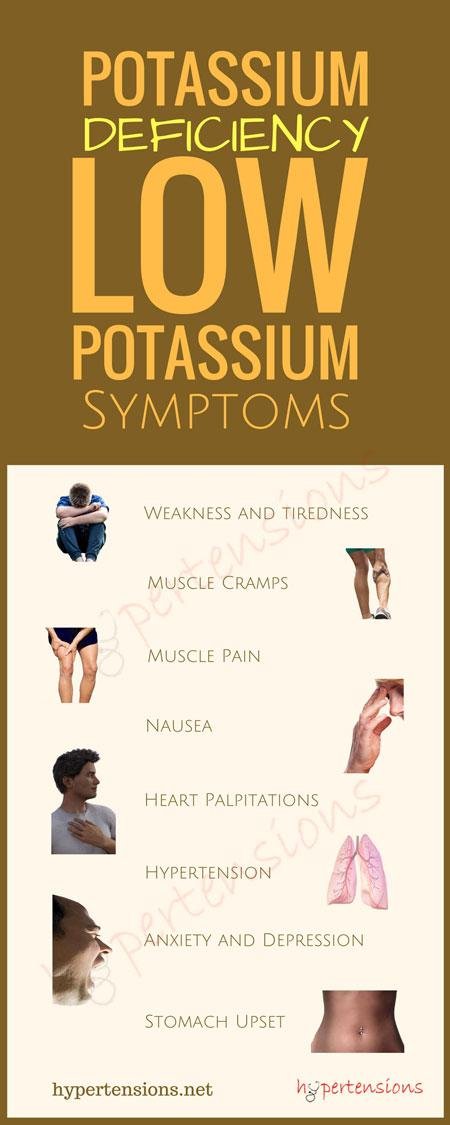Are you generally feeling weak, getting frequent muscle cramps in the arms and feet, and feeling tired most of the time? You may be suffering from potassium deficiency. All these are the symptoms of low potassium (hypokalemia) in the body.
Very Low Potassium Levels Can be Life Threatening
Potassium is a very important mineral along with sodium, magnesium, and other electrolytes for the proper functioning of all the cells, tissues, and organs in your body. Since it is an electrolyte it also conducts electricity. It plays a vital role in heart functioning, smooth muscle contraction, and proper digestion. Most of your potassium requirements are met by food including meat, fish, dairy, fruits, and vegetables.
Both low potassium (hypokalemia) and high potassium (hyperkalemia) are bad for your health. generally, all excess potassium is excreted through urine by the kidneys, so you may rarely have a high potassium problem. If kidney functioning is affected then you may have high potassium.
Cases of low potassium are on the rise as people are eating a high sodium diet that disturbs the sodium-potassium ratio in the body. Some conditions and diseases such as diarrhea, vomiting, excessive sweating, and certain metabolic disorders such as Crohn's Disease and malnutrition can also disturb this balance.
If you eat a healthy diet rich in fruits and vegetables then you should not have any potassium deficiencies. The normal potassium level is 3.5-5.0 mEq/L (milliequivalents per liter of blood). If your potassium level falls below 3.5 mEq/L, then it is considered low potassium.
Levels below 2.5 mEq/L can seriously affect the heart rhythm and be life-threatening requiring emergency medical treatment.
Potassium Deficiency Causes
There can be several causes of low potassium in your body.
- Diarrhea and vomiting are very common causes.
- Use of diuretics
- Asthma medicines such as beta-adrenergic drugs
- Use of insulin
- Enema and excessive use of laxatives
- Kidney disorders such as chronic kidney failure, acute kidney failure, renal tubular acidosis
- magnesium deficiency
- Adrenal disorders
- Leukemia
- Anorexia
- Bulimia
- Alcoholism
- Bariatric surgery
Low Potassium Symptoms

Most symptoms of potassium deficiencies are mild and vague. You can get these symptoms in the entire body as potassium is used by all cells of the body. So its deficiency will impact everywhere in the body from your nerves, muscles, gastrointestinal tract, kidneys, and heart.
- Feel tired and experience weakness
- Muscle cramps and sometimes these cramps can be severe that you can't move your limbs almost like paralysis
- Nausea and vomiting - vomiting worsens the deficiency as you lose more minerals
- Palpitations - irregular heartbeats
- Feeling thirsty more often
- Pass more urine
- Bloating
- Abdominal cramps
- Fainting
- High blood pressure
- Anxiety and depression
- Tingling and numbness
Some of the above symptoms can be symptoms of other conditions also. You will not know if you are suffering from potassium deficiency until you do a blood test. Although if you are taking some of the mentioned medicines mentioned in the cause and you feel the above symptoms then it may be easy for you to conclude that you may have a potassium deficiency. Once you do the medical tests it will confirm your doubts.
Irregular heart rhythms (arrhythmias) in the ECG and/or EKG also can indicate possibilities of low potassium and imbalance of electrolytes in the body.
Low Potassium Treatment
Depending on the severity of the potassium deficiency, treatment is given. If you are already taking certain medications for some other medical conditions then doctors may change the medicine. If your potassium levels are below 2.5mEq/L then the doctor may decide to put you on a cardiac monitor and put on IV fluids. Otherwise, potassium supplements in most cases are enough to control the low potassium levels.
Doctors may also advise you to eat foods rich in potassium.
Low Potassium Prevention
If you suspect or generally eat a high sodium diet then you must focus on the change of diet. Adding more fruits and vegetables to your diet generally is enough. The following easily accessible fruits are your best remedies for potential potassium deficiency.
- Banana
- Oranges
- Peaches
- Melons
- Tomatoes
In addition to these foods, several other food items are rich in potassium. Find them and eat them.
It is also important to not unnecessarily use diuretics and enemas to avoid potassium deficiency.

